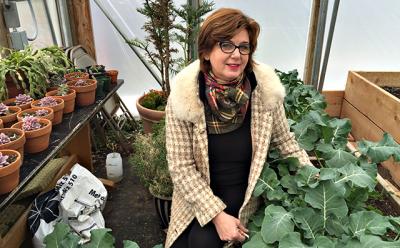Bridgehampton Teacher Receives National Award

Judiann Carmack-Fayyaz has many responsibilities at the Bridgehampton School, among them teaching classes in nutrition and botany and running the school’s garden and greenhouse program. Ms. Carmack-Fayyaz is the founder of Edible School Gardens, an organization of representatives of similar garden and greenhouse programs, and is the governor of the New York State chapter of Slow Food USA.
In recognition of her work, Ms. Carmack-Fayyaz is one of the recipients this year of a national award for excellence from the Department of Agriculture. She has also received the 2016 New York Agriculture in the Classroom Teacher of the Year Award. The national award was announced Tuesday. It will be presented at a conference in Arizona later this year, during which she will make a brief presentation.
“The ways in which you weave agricultural concepts into opportunities for teaching and learning inspires students, teachers, and families,” Katie Bigness, the coordinator of New York Agriculture in the Classroom, which is based at Cornell University, said in a letter to Ms. Carmack-Fayyaz. “We are pleased to recognize your innovative teaching of agriculture throughout your curriculum with this honor.”
For Ms. Carmack-Fayyaz, the national and state awards are a validation of her efforts. “I’ve been working really, really hard these past couple of years,” she said in an interview Tuesday. “It was really deeply fulfilling to get this kind of recognition. It was a real gift.” She said she hopes the awards “broadcast the message . . . that this work can be done anywhere in a similar vein.”
To earn the national award, Ms. Carmack-Fayyaz submitted a lesson plan geared for high school students that incorporated history and scientific problem solving. After providing a background in the ways food has been produced over time, the lesson challenged students to “be the scientists of the future” by exploring ways to grow enough plants to support a projected world population of nine billion by the year 2050. It also incorporated hydroponic cultivation.
“I am inspired to teach in a way that wasn’t available to me when I was in high school,” Ms. Carmack-Fayyaz said. In her tenth year at the Bridgehampton School, Ms. Carmack-Fayyaz also teaches robotics, digital photography, and other technologies. “There are many students who learn by doing and who have interests that transcend academics. I also love what I do because I hope to model what lifelong learning should look like.”
